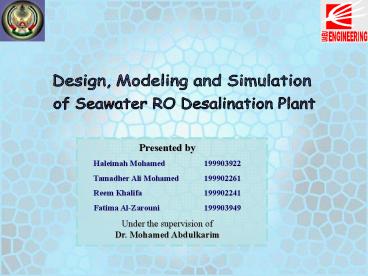Design, Modeling and Simulation - PowerPoint PPT Presentation
1 / 30
Title:
Design, Modeling and Simulation
Description:
Presented by Haleimah Mohamed 199903922 Tamadher Ali Mohamed 199902261 Reem Khalifa 199902241 Fatima Al-Zarouni 199903949 Under the supervision of – PowerPoint PPT presentation
Number of Views:154
Avg rating:3.0/5.0
Title: Design, Modeling and Simulation
1
Design, Modeling and Simulation
of Seawater RO Desalination Plant
Presented by Haleimah Mohamed 199903922
Tamadher Ali Mohamed 199902261 Reem
Khalifa 199902241 Fatima Al-Zarouni 199903949 Un
der the supervision of Dr. Mohamed Abdulkarim
2
Process flow Diagram
3
Material Balance
- Media Filter
Used to prevent reverse osmosis membrane from
fouling by removing large percentage of suspended
solid from feed water
SDI measurement commonly used to indicate the
effectiveness of media filter
Almost, all RO membrane manufacture recommends
SDI to be less than 3
4
Material Balance
- Antiscalant
5
Material Balance
- Cartridge filter
6
Material Balance
- Cartridge filter
7
Material Balance
- Dechlorination
Normally, the available free chlorine
concentration before RO membrane is 0.5 1 ppm.
The maximum allowable chlorine concentration
before RO membrane is 0.05 ppm.
Residual free chlorine can be removed
by adsorption onto activated carbon media
filter chemical reducing agent (SBS)
8
Material Balance
- Dechlorination Chemical
Sodium Bisulfite can be formed by dissolving
Sodium Metabisulfite (SMBS) in water
In theory, 1.34 mg of SMBS will remove 1 mg of
free chlorine.
In practice, designers used to add 3 mg/L of SMBS
of chlorine
Total amount of free chlorine in water 503
106 mg /day
9
Material Balance
- Dechlorination Chemical
The amount of SMBS needed to remove free chlorine
7968.22 mole/day
The amount of moles of Sodium Bisulfite needed to
remove the free chlorine 15,936.13 mole/day
The dosage rate of SBS needed to remove residual
chlorine 205.58 gal/day
10
Material Balance
- RO membrane
RO membrane
11
Material Balance
- RO membrane
12
Material Balance
- RO membrane
Q2 47 MGD
TDS2 2156.79 ppm
13
Material Balance
- RO membrane
Material balance on second stage
TDS5 13415 ppm
Material balance on first stage
The overall salt balance for the system
TDS6 61550.46 ppm
14
Material Balance
- NaOH
Added for pH adjustment to minimize the corrosion
in the product water pipes
The required pH for drinking and potable water is
in the range of 6.5 9.5
The calculation was based on
Neutralization of acid
Adjust pH from 7 to 8
15
Design
- Cartridge filter
Capacity of each filter 600L/min
feed water flow rate / filter capacity Number
of filter element
number of filter 582 filter
Filter cartridge/ vessel 26
?P 4 psi per 1 m3/min The feed flowrate inter
each vessel 15 m3/min Total ?P 15 x 4 60
psi 4 bar
16
Design
- Ultrafiltration
17
Design
- Ultrafiltration
18
Design
- RO membrane
19
Design
- RO membrane
For feed
20
Design
- RO membrane
21
Design
- RO membrane
22
Design
- RO membrane
The calculations of pressure drop in RO membrane
23
Environmental Impact
- Chemicals
- Sodium Hypochlorite
- Antiscalent
- Hydrochloric acid (HCL)
- Sodium bio-sulphate
- Coagulant (Aluminum sulphate)
- NaOH
- 2. Process
- MMF
- Membrane
- Desalination plant Intake
- Products
- Brine
24
Actions
- Chemicals
- Process
- Sand filter
- Advantage
- Sand work as a filter
- Disadvantages
- Need higher pressure
- Limits on flow rate
- Cost
25
Actions
3. Products
- Mix brine with seawater before discharge.
- 2) More than one discharge.
- These are located a way of each other at a
distance.
3) Mixing brine water with cooling water coming
from adjacent power plant.
4) Evaporation ponds
5) Deep well disposal
26
PID Before HAZOP
HAZOP Analysis
27
HAZOP Analysis
HAZOP analysis on water feed entering multi
media filter. (Line no. 2)
28
PID After Hazop
29
Modeling and Simulation
- Reference Process
30
Any Question??































![Modeling MEMS Sensors [SUGAR: A Computer Aided Design Tool for MEMS ] PowerPoint PPT Presentation](https://s3.amazonaws.com/images.powershow.com/4532729.th0.jpg?_=20200927124)